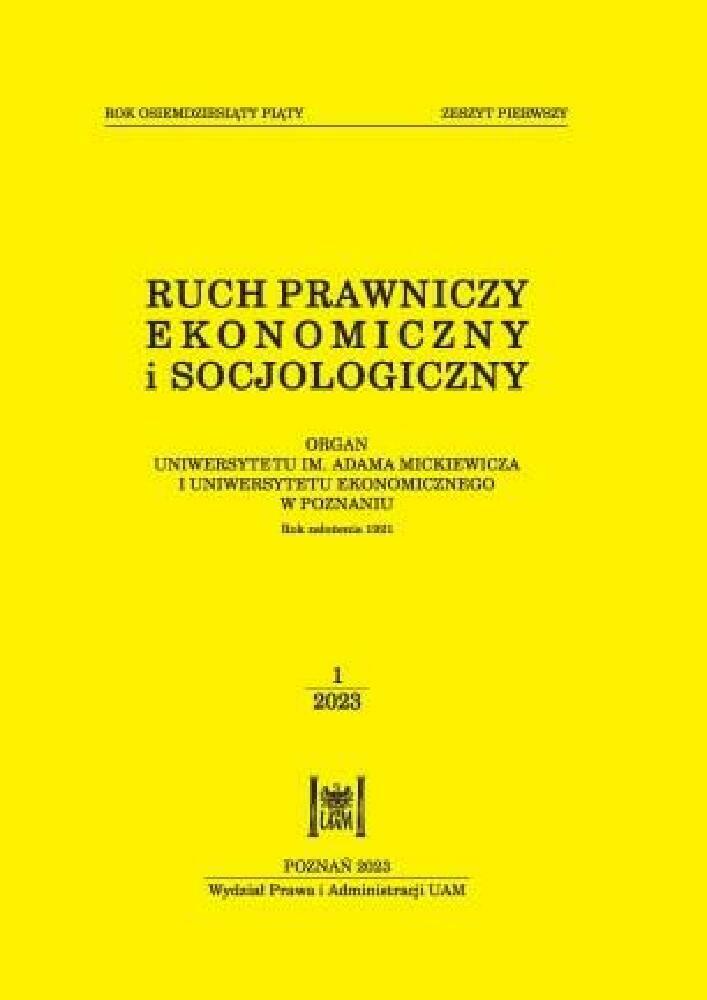Abstract
As a result of the 2014 reform of the EU public procurement system, there has been a paradigm shift in public procurement law. The 2014 Directives underlined that public procurement plays a key role in implementing the EUROPA 2020 strategy, as one of the market-based instruments used to achieve smart, sustainable and inclusive growth while ensuring the most efficient use of public funds. Strategic public procurement, related to the implementation of the principle of sustainable development and the promotion of innovation, has been recognized as one of the basic elements of the investment environment and a strategic instrument in the economic policy toolkit of each Member State. As a consequence of the implementation of the 2014 directives,
changes have been made to the Polish public procurement law. The Act of 11 September 2019 put more emphasis on the implementation of the Best Value for Money principle while simultaneously focusing on the principle of sustainable development. However, the mere regulation of public procurement law instruments is not sufficient to use the potential of strategic public procurement for the needs of development policy. This article suggests that a well-coordinated state policy should be taken into account in order to improve the efficiency of the procurement process. It also states that the adopting of behavioral economics tools and behavioral law & economic analysis, in order to develop appropriate practices on the public procurement market, might be crucial for correcting the dysfunctions of market mechanisms and achieving socioeconomic development goals.
References
Atkinson, A.B. (2017). Nierówności. Co da się zrobić? Tłum. M. Ratajczak, M. Szlinder. Warszawa.
Becker, G.S., Posner, R.A. (2013). Nieoczywistości. Ekonomiczna teoria wszystkiego. Tłum. S. Kowalski. Warszawa.
Bovis, Ch.H. (2010). Public Procurement, Public-Private Partnerships and Public Services in the EU. European Public Private Partnership Law Review 2: 85–96. DOI: https://doi.org/10.21552/EPPPL/2010/2/98
Fukuyama, F. (2012). Historia ładu politycznego. Od czasów przedludzkich do rewolucji francuskiej. Tłum. N. Radomski. Poznań.
Grabowski, J. (2013). Prawo a gospodarka. W: R. Hauser, Z. Niewiadomski, A. Wróbel (red.), System prawa administracyjnego. Tom 8a: Publiczne prawo gospodarcze (s. 1–40). Warszawa.
Hartung, W., Bagłaj, M., Michalczyk, T., Wojciechowski, M., Krysa, J., Kuźma, K. (2015). Dyrektywa 2014/24/UE w sprawie zamówień publicznych. Warszawa.
Kokocińska, K. (2014). Prawne mechanizmy prowadzenia polityki rozwoju w zdecentralizowanych strukturach władzy publicznej. Poznań.
Ling Song, J.Y. (2021). Public purchasing in the EU during the COVID-19 pandemic. W: C.R. Hamer, M. Comba (eds.), Centralising Public Procurement: The Approach of EU Member States (s. 100–120). Cheltenham.
Mazzucato, M. (2018). The Entrepreneurial State. Debunking Public vs. Private Sector Myths. Penguin Random House UK.
Neamtu, B., Dragos, D.C. (2015). Sustainable public procurement: the use of eco-labels. European Procurement & Public Private Partnership Law Review 2: 92–101.
Nowicki, H. (2017). Cele systemu zamówień publicznych. W: T. Kocowski, J. Gola (red.), Przedsiębiorca w społecznej gospodarce rynkowej. System zamówień publicznych w Polsce. Prace Naukowe Uniwersytetu Ekonomicznego we Wrocławiu 497: 53–63. DOI: https://doi.org/10.15611/pn.2017.497.03
Nowicki, P. (2017). Zamówienia publiczne jako instrument kształtowania gospodarki przez państwo. W: T. Kocowski, J. Gola (red.), Przedsiębiorca w społecznej gospodarce rynkowej. System zamówień publicznych w Polsce. Prace Naukowe Uniwersytetu Ekonomicznego we Wrocławiu 497: 114–127. DOI: https://doi.org/10.15611/pn.2017.497.08
Nowicki, P. (2019). Aksjologia prawa zamówień publicznych. Pomiędzy efektywnością ekonomiczną a instrumentalizacją. Toruń.
Piketty, T. (2015). Kapitał w XXI wieku. Tłum. A. Bilik. Warszawa.
Prier, E., Schwerin, E., McCue, C.P. (2016). Implementation of sustainable public procurement practices and policies: a sorting framework. Journal of Public Procurement 16(3): 312–346. DOI: https://doi.org/10.1108/JOPP-16-03-2016-B004
Romans, J.T. (1966). Moral suasion as an instrument of economic policy. The American Economic Review 56(5): 1220–1226.
Szydło, M. (2014). Prawna koncepcja zamówienia publicznego. Warszawa.
Thaler, R.H. (2018). Zachowania niepoprawne. Tworzenie ekonomii behawioralnej. Tłum. J. Konieczny. Poznań.
Thaler, R.H., Sunstein, C.R. (2017). Impuls. Jak podejmować właściwe decyzje dotyczące zdrowia, dobrobytu i szczęścia. Tłum. J. Grzegorczyk. Poznań.
License
Copyright (c) 2023 WPiA UAM

This work is licensed under a Creative Commons Attribution 4.0 International License.





